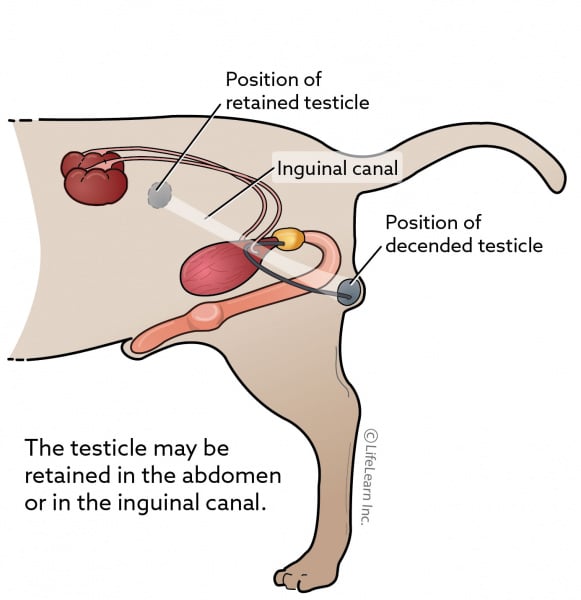Can a Puppy Whose Balls Dropped Get Another Dog Pregnant
What is cryptorchidism?
Cryptorchidism is the medical term that refers to the failure of one or both testicles (testes) to descend into the scrotum. The testes develop almost the kidneys within the belly and usually descend into the scrotum by ii months of age. In certain dogs it may occur later, but rarely after six months of age. Cryptorchidism may be presumed to be present if the testicles cannot be felt in the scrotum later on two to iv months of age.
If the testicles aren't in the scrotum, where are they? 
In most cases of cryptorchidism, the testicle is retained in the abdomen or in the inguinal canal (the passage through the abdominal wall into the genital region through which a testicle ordinarily descends). Sometimes the testicle volition be located merely under the pare (in the subcutaneous tissues) in the groin region, between the inguinal culvert and the scrotum.
How is cryptorchidism diagnosed?
In cases of abdominal cryptorchidism, the testicle cannot be felt from the outside. Abdominal ultrasound or radiographs (X-rays) may be performed to determine the exact location of the retained testicle but this is not often done before surgery as information technology is not required to go along with surgery. Typically just one testicle is retained, and this is called unilateral cryptorchidism .
If y'all have a dog that does not announced to have testicles but is exhibiting male behaviors, a hormonal test chosen an hCG stimulation examination can exist performed to come across if he is already neutered. Even simpler, your veterinarian can check for penile spines which are dependent on testosterone and will disappear half-dozen weeks subsequently neutering.
What causes cryptorchidism, and how common is it?
Cryptorchidism occurs in all breeds, but the toy breeds, including toy Poodles, Pomeranians, and Yorkshire Terriers, are at higher take a chance. Approximately 75% of cases of cryptorchidism involve just one retained testicle while the remaining 25% involve failure of both testicles to descend into the scrotum. The right testicle is more than twice as probable to be retained as the left testicle.
Cryptorchidism affects approximately one-3% of all dogs. The condition appears to be inherited since it is commonly seen in families of dogs, although the exact cause is not fully understood.
What are the signs of cryptorchidism?
This status is rarely associated with pain or other signs, until or unless a complication develops. In its early stages, a unmarried retained testicle is significantly smaller than the other, normal testicle. If both testicles are retained, the dog may be infertile. The retained testicles continue to produce testosterone only generally neglect to produce sperm.
"If both testicles are retained, the canis familiaris may be infertile."
One complication of cryptorchidism is spermatic cord torsion (twisting onto itself). If this occurs, there will signs consistent with sudden and severe intestinal pain. More frequently, a retained testicle will get cancerous. The clinical signs associated with testicular cancer depend upon the specific type of cancer.
What is the treatment for cryptorchidism?
Neutering and removal of the retained testicle(s) are recommended as soon as possible. If merely one testicle is retained, the domestic dog will accept two incisions - one for extraction of each testicle. If both testicles are in the inguinal canal, there will also be 2 incisions. If both testicles are in the abdomen, a single abdominal incision will allow access to both.
What if I don't want to neuter my dog?
At that place are several good reasons for neutering a domestic dog with cryptorchidism. The first is to remove the genetic defect from the brood line. Cryptorchid dogs should never be bred. Second, dogs with a retained testicle are more than likely to develop a testicular tumor (cancer) in the retained testicle. Finally, dogs with a retained testicle typically develop the undesirable characteristics associated with intact males similar urine mark and aggression.
"The risk of developing testicular cancer is estimated to be at least x times greater in dogs with cryptorchidism than in normal dogs."
The chance of developing testicular cancer is estimated to be at least ten times greater in dogs with cryptorchidism than in normal dogs.
What is the prognosis for a domestic dog with cryptorchidism?
The prognosis is excellent for dogs that undergo surgery early, earlier problems develops in the retained testicle. The surgery is relatively routine, and the outcomes are overwhelmingly positive.
Source: https://vcahospitals.com/know-your-pet/retained-testicle-cryptorchidism-in-dogs
0 Response to "Can a Puppy Whose Balls Dropped Get Another Dog Pregnant"
Post a Comment